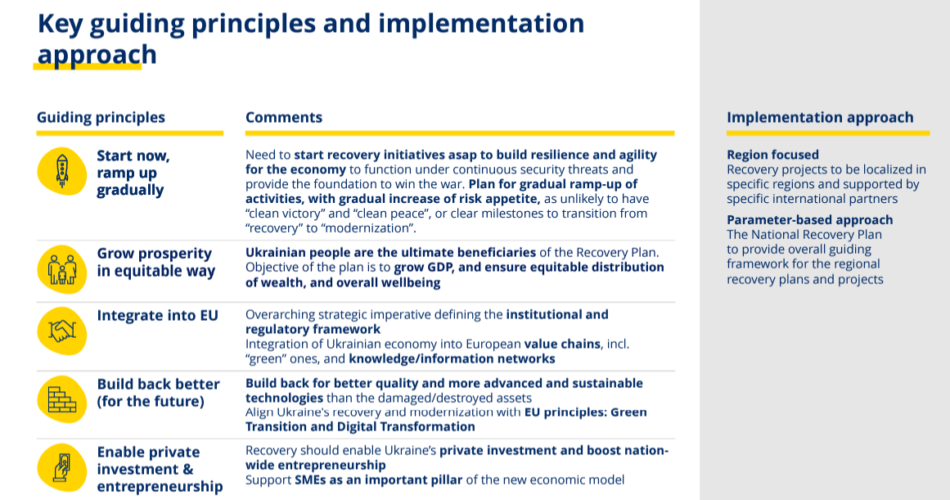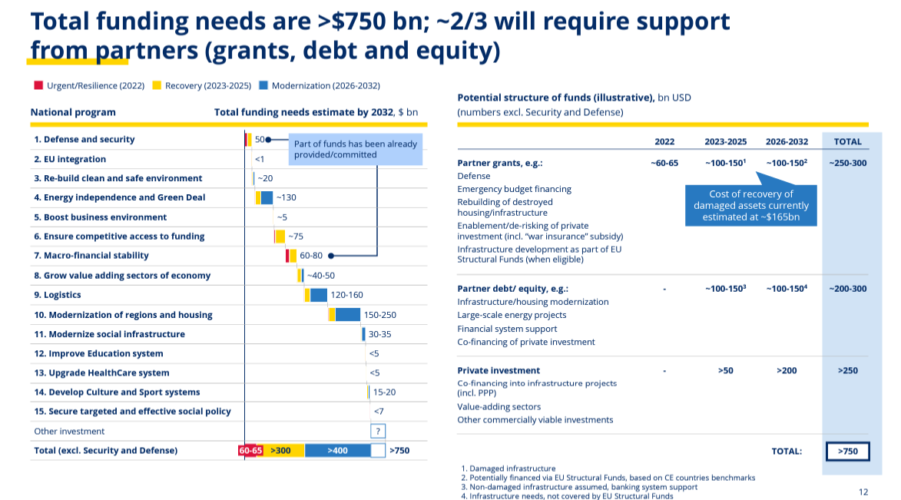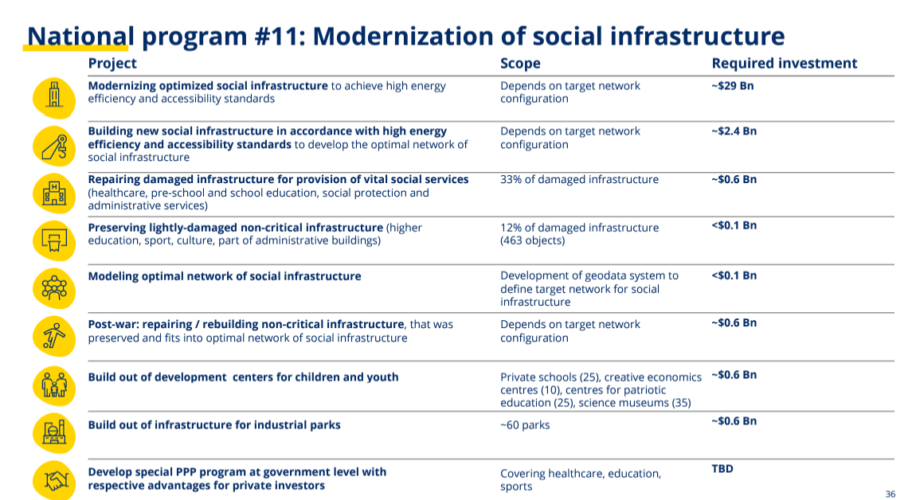The international Ukraine Recovery Conference has taken place
On 4-5 July 2022, an international Ukraine Recovery Conference (URC 2022) has taken place in Lugano (Switzerland).
The conference is the 5th in a series of annual high-level political events. In the previous years, events were called Ukraine Reform Conferences and were hosted in the UK, Canada, Denmark and Lithuania. Considering the full-scale invasion of Ukraine by the russian federation, it was decided to shift the focus of this year’s conference to recovery, which is reflected in the title.
The key topics discussed in Lugano were:
- The Recovery and Development Plan of Ukraine (within the United 24 initiative of President Zelenskyy) and different contributions of international partners for the recovery of Ukraine;
- The methods, priorities and principles of recovery;
- Social, economic, environmental and infrastructure recovery from damages and losses caused by the war;
- Reforms that are possible or necessary to implement in the current situation.
The conference started with the opening plenary “Framework for smart and sustainable recovery process in Ukraine”. The President and Foreign Minister of the Swiss Confederation, Ignazio Cassis, welcomed the participants of the conference, including the delegation from Ukraine. He emphasised the need to unite to promote the sustainable recovery of Ukraine, following the Build Back Better principle and noted that a framework for the recovery will be presented as a final document of the conference, the Lugano Declaration. A prerequisite for success, according to him, is that the original plan for the conference, focusing on institutional reforms, and the current plan, focusing on reconstruction, form a holistic approach.
Next, Ignazio Cassis gave the floor to the President of Ukraine, Volodymyr Zelenskyy, who addressed the participants online. The President thanked all the participants and emphasised the need to defend democratic values. He described the various types of infrastructure that had been damaged, including schools, kindergartens, hospitals, maternity hospitals and housing units, and stressed that the reconstruction process should start immediately.
Ursula von der Leyen, the European Commission President, has told participants about the European Commission’s proposal to the Government of Ukraine to create a Recovery and Reconstruction Platform to coordinate actions and manage the implementation of strategically essential reforms.
The Prime Minister of the Czech Republic, Petr Fiala, has expressed support for Ukraine on behalf of the people of his country.
The Prime Minister of Ukraine, Denys Shmyhal, has described how the reforms, discussed during the conferences of the past years and introduced in Ukraine, have strengthened our resilience and the ability to resist the aggressor. He explained that Ukraine’s Recovery Plan has three key phases: 1) to restore immediately what is possible to restore and is critical for people’s lives; 2) “fast recovery” – to implement, immediately after the victory of Ukraine, thousands of reconstruction projects, such as the reconstruction of schools, hospitals, the construction of temporary housing, etc.; 3) long-term transformation in all sectors. Mr Shmyhal emphasised the importance of implementing large industry projects following the European standards:
“First, it will mean a new quality of restoration. Second, this will ensure the transparency of rules for private investors whom we want to attract to the implementation of these projects. Third, it will expedite further integration of Ukraine into the European Union.”
The structure of the Ukrainian recovery platform was formed. He also noted that the key principles that will facilitate efficient change and country recovery are: the highest possible level of security for people and business; the Build Back Better principle; European integration and compliance with the criteria of candidacy and, in the near future, membership in the EU; the Rule of law; transparency and accountability; reconstruction of Ukraine, relying as much as possible on “green” technologies; digitization and involvement of private capital in the reconstruction process.

The Prime Minister noted that the key source of recovery funds should be the confiscated assets of russia and russian oligarchs. The second source is grants and low-interest loans from International Financial Organisations and partner countries. The third and fourth sources are private sector investments (including PPPs) and extra-budgetary contributions from individuals and corporations. The fifth source is the budget of Ukraine.

Ukraine’s Recovery Plan entails the development of a special PPP program at the state level.

Elizabeth Truss, Secretary of State for Foreign, Commonwealth and Development Affairs of the United Kingdom noted that it is planned to study options for engaging businesses, tech companies and universities of Great Britain in the recovery of Ukraine. It might involve cooperation with the European Bank for Reconstruction and Development (ERBD), the main office of which is located in London. The goal is to make Ukraine one of the top destinations for international investments in 2023.
Odile Renaud-Basso, the President of the EBRD has emphasised the need to support and strengthen the private sector now, before the end of the war, to reinforce the country’s economy in general.
Anna Bjerde, the World Bank Vice President for Europe and Central Asia, has discussed the future of Ukraine with the Prime Minister of Ukraine, Denys Shmyhal and international partners of the World Bank. Among other things, a new partnership financing mechanism for Ukraine – “Multi-Donor Resources for Institutions and Infrastructure (MRII)” was discussed.
Teresa Chervinska, the Vice President of the European Investment Bank (EIB) has explained that private investments and their effective blending with public funds can become key to the rapid, high-quality and sustainable reconstruction of Ukraine. She told the participants about the EIB’s proposal to create a new instrument, the EU-Ukraine Gateway Trust Fund, which will be a part of Ukraine’s Recovery Plan:
“By setting up the Fund, we will strengthen the project-related arm of EU support to Ukraine. […] What is very important, it would also catalyse private sector investments, which has been mentioned many times today. […] This additional instrument would be very supportive to attract not only public but also private financing which is very important for rebuilding Ukraine.”
5 break-out sessions also took place that day. The first session was titled “Economic Recovery: From resilience to transformation”. The speakers of the session were: the Head of the Office of the President of Ukraine, Andrii Yermak; the Chairman of the Committee on Finance, Tax and Customs Policy, Danylo Hetmantsev; the Managing Director for Eastern Europe and the Caucasus at the EBRD, Matteo Patrone; the Delegate of the Board of Directors and the CEO of Weidmann Holding AG, Franziska Tschudi Sauber and IFC’s Vice President for Europe, Latin America and the Caribbean, Alfonso Garcia Mora. The participants explored the topic of the economic recovery of Ukraine.
Matteo Patrone explained the pertinence of enlisting the private sector in the reconstruction of Ukraine:
“It is important that the private sector, for instance, is involved in privatisations, reconstruction of infrastructure, and PPPs. And an effort to make PPPs more fungible is absolutely crucial.”
Alfonso Garcia Mora illuminated the role of international effort coordination in engaging the private sector in project implementation:
“At IFC, we use the concept of the cascade. It means that those projects and investments that the private sector is able to finance, should be left to the private sector. For those that require taking risks, let’s think of the PPP structure and blended finance.”
The second session was titled “Social Recovery: Investing in People”. The participants were the First Lady of Ukraine, Olena Zelenska; the Deputy Head of the Office of the President of Ukraine, Yuliya Sokolovska; the Administrator of the United Nations Development Programme, Achim Steiner; WHO representative in Ukraine, Jarno Habicht; Regional Country Director for Eastern Europe at the World Bank, Arup Benerji and the Head of the Board of ZMINA Human Rights Center, Tetiana Pechonchyk. They have discussed social aspects that require recovery. Ukraine’s Recovery Plan, regarding the use of the PPP mechanism, calls for the creation of a public-private marketplace platform for the labour market, which is expected to facilitate the resolution of the main problems of the unemployed.
During the next session, “Digitalization and Recovery” the role of digitalization in the recovery of Ukraine was outlined. The Vice Prime Minister of Ukraine and the Minister of Digital Transformation of Ukraine, Mykhailo Fedorov, described the country’s successful endeavours in the field of digitization and presented a detailed plan for the digital recovery of Ukraine.
Regarding the use of the PPP mechanism, Ukraine’s Recovery Plan envisages the introduction of blockchain technology in the field of the national economy under the PPP model. This will enable the creation of a new management mechanism, including the development of blockchain-based public registers and the modernisation of the existing registers. In general, the reinforcement of the public-private mechanism in the field of cyber and information security is planned.
The speakers of the fourth session, “Infrastructure recovery: Building back better” were the Minister of Infrastructure of Ukraine, Oleksandr Kubrakov; the Minister for Communities and Territories Development of Ukraine, Oleksiy Chernyshov; the Federal Councillor, Head of the Federal Department for Energy, Transports, Environment and Telecommunications of Switzerland, Simonetta Sommaruga; the Mayor of Mariupol, Vadym Boychenko and the Deputy Managing Director of the European Investment Bank, Markus Berndt. The panellists discussed the extent of infrastructure destruction caused by the war and outlined ways to restore it. To restore infrastructure quickly, while ensuring social and economic recovery, coordination of efforts of all partners is needed. The panellists explored how to turn the destruction caused by the war into an opportunity to modernise Ukraine’s ageing infrastructure, following modern standards, as well as reduce CO2 emissions to combat climate change. Thus, simplification of investment attraction mechanisms (including PPPs) and the digitalization of state-investor interactions are some of the main priorities for the medium-term recovery perspective. To accelerate the restoration of the infrastructure destroyed by the aggressor state, Ukraine’s Recovery Plan calls for the use of a simplified PPP mechanism, involving the implementation of PPPs based on payments made from the budget, including availability-based PPPs, in which the state does not transfer the risk of demand to the investor, but rather pays for infrastructure “in instalments” (this mechanism is already a part of Ukrainian legislation as a result of the adoption of the draft law No. 5090 in the 2nd reading on February 15, 2022). Such PPP projects are expected to become key for the post-war reconstruction of Ukraine, especially for the development of social infrastructure. Overall, Ukraine’s Recovery Plan envisages the simplification of the general PPP project preparation procedure at the state and local levels.
The last session was titled “Environmental recovery: going green and achieving energy security”. The participants of this session were the Minister of Energy of Ukraine, German Galushchenko; the Minister of Ecology and Natural Resources of Ukraine, Ruslan Strilets; the Deputy Director-General, Head of Support Group for Ukraine at the European Commission, Katarina Mathernova; Ukrainian Head of the EU-Ukraine Civil Society Platform, Olena Pavlenko and the Director of the Energy Community Secretariat, Artur Lorkowski. The participants explored the extent of environmental damage caused by the war and its impact on the Ukrainian population in the short and long term. They discussed new models of environmental protection during the economic, social and infrastructure recovery of Ukraine as well as opportunities for green recovery and the development of a more ecologically sustainable society. Some of the key opportunities are the restoration of destroyed infrastructure and the systemic restructuring of the economy to rely on clean, low-carbon and energy-efficient technologies; integration into EU industrial alliances and participation in new production chains; as well as using international financial aid, green finance and investments to implement measures that would prevent climate change and facilitate climate change adaptation, build a circular economy and preserve the environment.
On the 5th of July, the National and institutional statements’ session took place. The representatives of the allied countries expressed their support for Ukraine. International organisations also expressed their support. A video statement was recorded by the UN Secretary-General, Antonio Guterres. Other institutions, the representatives of which expressed support were UNDP, Council of Europe, EBRD, European Commission, European Investment Bank, World Bank, UNESCO, OSCE, International Monetary Fund and WHO.
During the closing plenary, the final document of URC 2022, the Lugano Declaration, was presented. The Prime Minister of Ukraine, Denys Shmyhal has expressed gratitude to the President of the Swiss Confederation, Ignazio Cassis, and the President of the European Commission, Ursula von der Leyen, for supporting our country and organising this conference.
Conference participants adopted the final document, the Lugano Declaration. Among other things, the Declaration calls for the creation of a coordination platform for the partners.
As a result, seven principles, determining the criteria and methods of recovery were approved:
- Partnership. Ukraine will lead the reconstruction process and implement it together with international partners;
- Reform focus;
- Transparency, accountability and rule of law;
- Democratic participation;
- Multi-stakeholders engagement;
- Gender equality and inclusion;
- Sustainability.
The next event of the day was the press conference of the President of the Swiss Confederation, Ignazio Cassis, and the Prime Minister of Ukraine, Denys Shmyhal. The Prime Minister noted that the reconstruction of Ukraine will be a huge project for businesses, which can participate via the public-private partnership mechanism.
The President of the Swiss Confederation, Ignazio Cassis, concluded that
“Ukraine should lead [the reconstruction process]. And we, countries and international organisations gathered in Lugano, will support it on its path.”
An economic forum, “The private sector and the reconstruction of Ukraine”, was also held that day. Representatives from the Ukrainian government presented the current business and infrastructure situation in Ukraine. They showcased their vision for renewal and highlighted sectors prioritised for reconstruction. Companies discovered how to get involved in reconstruction projects and identified potential partners by networking with Ukrainian representatives from the government and the private sector.
Mr Shmyhal noted that the PPP mechanism should become one of the key resources for the recovery of the country, along with the frozen assets of the aggressor;
“We invite businesses to Ukraine to participate in concessions, joint production and distribution of products and operate under other public-private partnership models. The opportunities and capabilities are huge, therefore, I am certain that businesses will indeed be able to find exceptionally interesting projects and implement them in our country both during the war, taking into account opportunities for political risk insurance, and immediately after the war.”